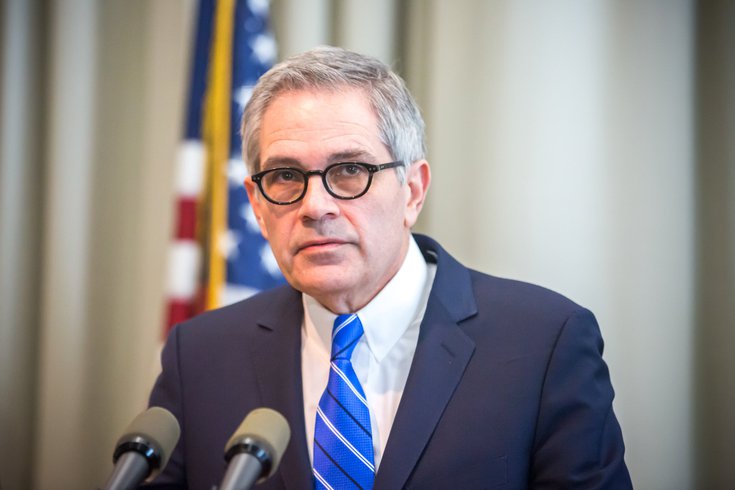
November 24, 2022
 Thom Carroll/For PhillyVoice
Thom Carroll/For PhillyVoice
The Pennsylvania Senate's impeachment trial of Philadelphia District Attorney Larry Krasner is set to begin on Jan. 18, according to Senate Republicans. The legislative body will reconvene next week to take procedural steps before the trial begins.
Philadelphia District Attorney Larry Krasner's impeachment trial is scheduled to begin in the Pennsylvania Senate this January, state Senate Republicans said on Wednesday.
The decision to reconvene comes just over a week after the city's lead prosecutor was impeached by the state House of Representatives in a 107-85 vote along party lines. Only one representative from Philadelphia, Rep. Martina White, voted for impeachment. The District Attorney's Office has long denied wrongdoing and has labeled the impeachment effort a political stunt as Krasner has not been accused of a crime.
Krasner will be summoned to the Senate to answer to impeachment, and will have until Dec. 21 to respond. He will then be ordered to appear before the state Senate on Wednesday, Jan. 18 at 11 a.m. before the impeachment trial can begin, according to Senate Republicans.
Philadelphians’ votes, and Philadelphia voters, should not be erased. History will harshly judge this anti-democratic authoritarian effort to erase Philly's votes – votes by Black, brown, and broke people in Philadelphia. And voters will have the last word. https://t.co/22wAaNGkw9
— DA Larry Krasner (@DA_LarryKrasner) November 16, 2022
Convictions on articles of impeachment is rare in Pennsylvania, where the legislative body has removed just one elected official from office in 340-year history: Rolf Larsen, a former state Supreme Court justice who was impeached in 1994 for a host of ethics violations. Larsen's impeachment and removal is the sole precedent upon which the state legislature is basing its impeachment of Krasner.
The standard for impeachment in Pennsylvania is "any misbehavior in office," and the seven articles of impeachment against Krasner detail several policies and actions taken by Krasner, which its sponsors believe have contributed to the city's rise in crime.
These policies include not seeking cash bail for people charged with misdemeanors and nonviolent felonies, not prosecuting people for prostitution or marijuana possession, and considering a defendant's immigration status in the plea bargaining process.
The articles of impeachment paint a picture of a "city that has descended into an unprecedented crisis of lawlessness," describing violent crime occurring in all parts of the city during all hours of the day under Krasner's leadership, including on public transportation, near schools, and in populated neighborhoods filled with families.
In a written statement following his impeachment, Krasner noted that in Pennsylvania's history, the House of Representatives has never voted to impeach someone because they do not like their ideas.
"They have impeached me without providing a single shred of evidence connecting our policies to any uptick in crime," Krasner said. "We were never given the opportunity to defend our ideas and policies — policies I would have been proud to explain. That Pennsylvania Republicans willingly avoided hearing the facts about my office is shameful. Each Philadelphia voter is not just 3/5ths of a voter. Philadelphia is not Pennsylvania's colony. Philadelphians get taxation and representation. Philadelphia's votes, and Philadelphia's voters, should not be erased."
Though the impeachment trial is sure to set off a series of legal proceedings, experts do not believe it's possible for the state Senate to remove Krasner from office. In order to convict and remove an impeached official from office, the state Senate needs a two-thirds majority.